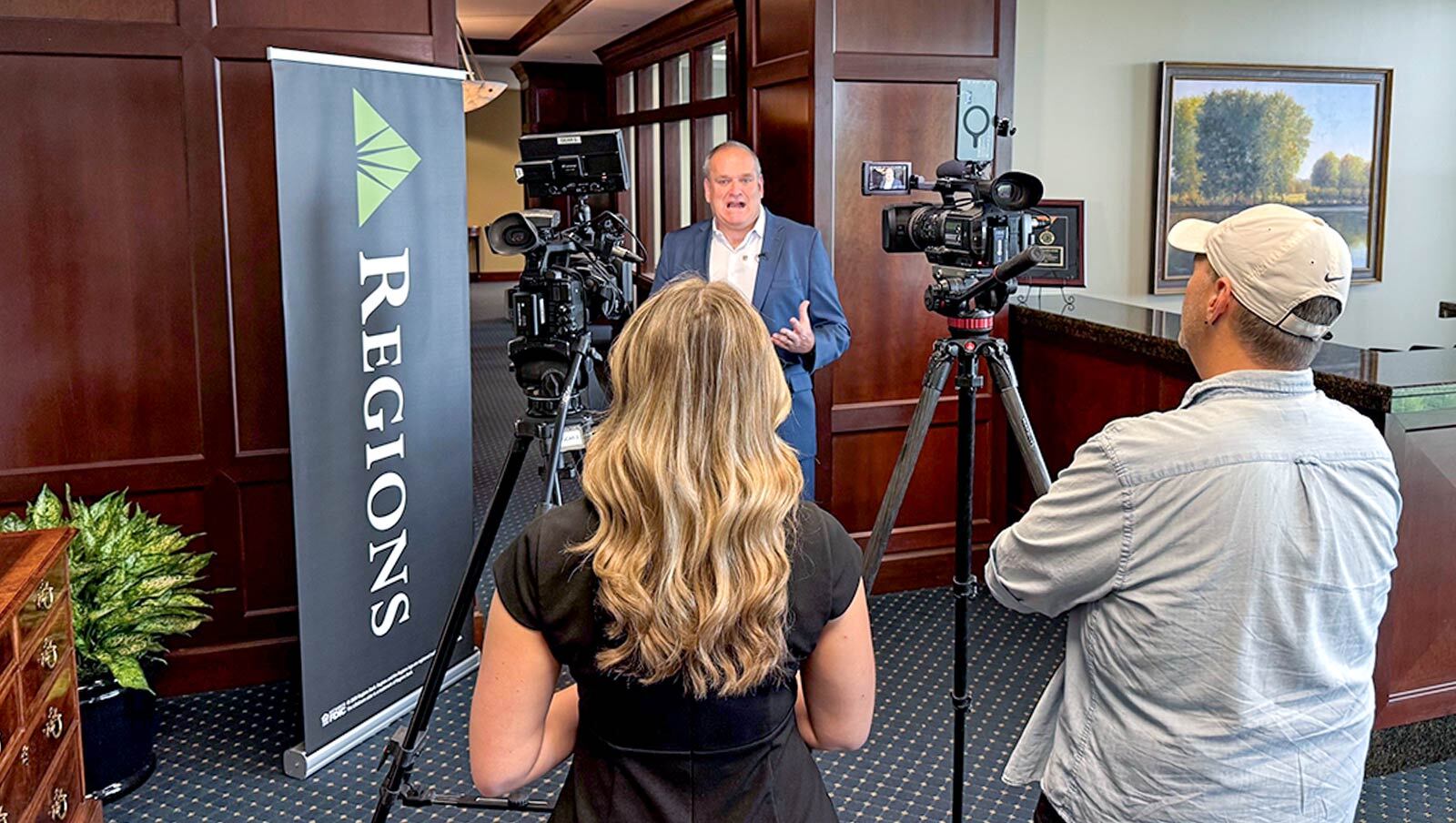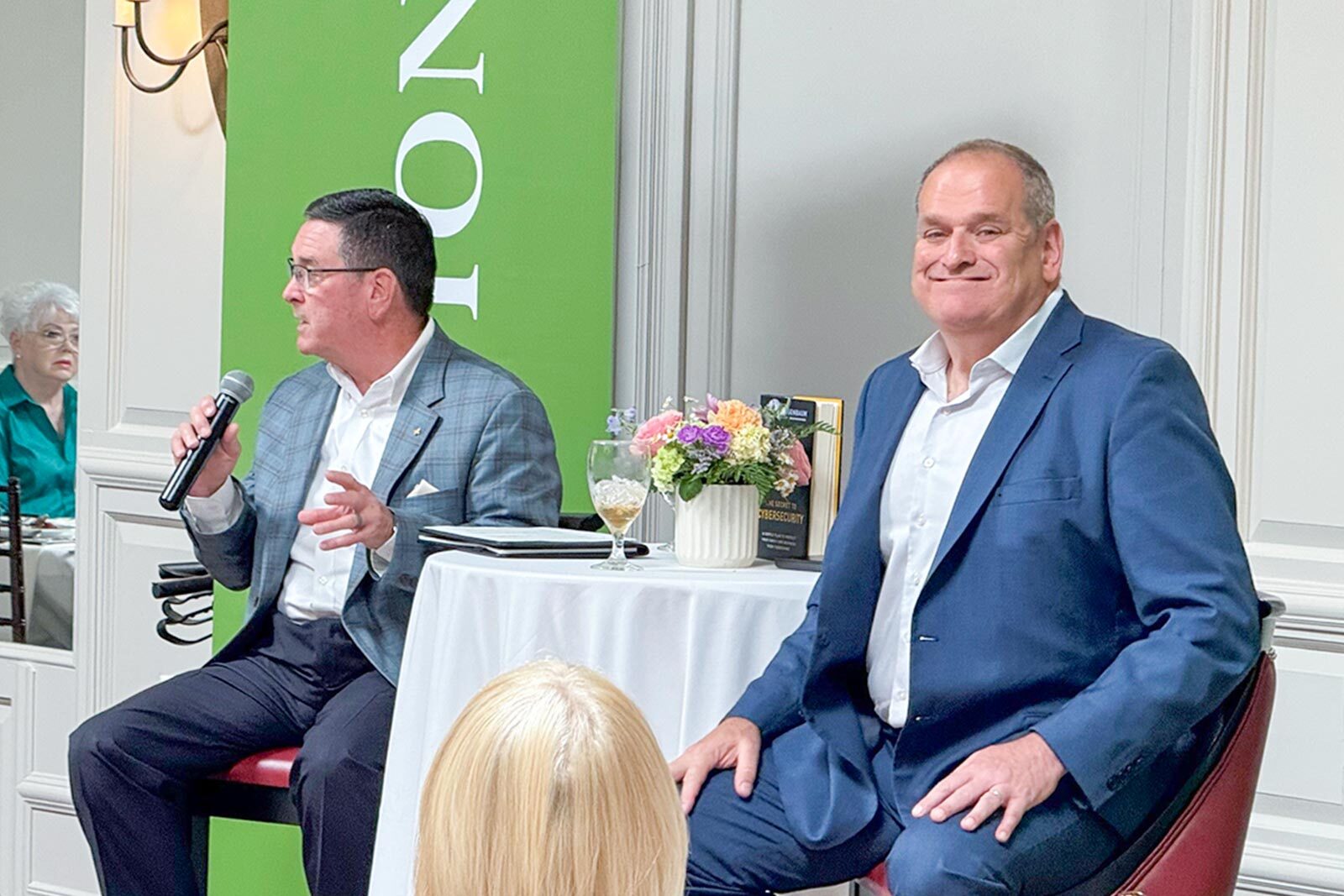No matter how well you protect your private information, someone somewhere is going to let you down.
“Well, 2024, was the year of the (big data) breach even though a lot of you did every single thing that was correct,” said Scott Augenbaum, retired FBI special agent and a respected author who now works in the private sector fighting fraud. One corporation “lost 160 million pieces of information. Another lost millions more of your information.
“So, your stuff is out there. My stuff is out there – our names, our date of birth, our Social Security numbers. It’s floating around on the dark web. But I’m going to show you how easy this is to prevent.”
In Tennessee, there were 11,000 reports of fraud totaling over $190 million in losses. Bruce Duggins, Regions Private Wealth leader in East Tennessee
In Knoxville, Tennessee, Augenbaum joined Jeff Taylor, Regions’ head of Commercial Fraud Forensics, and local banking leaders in a luncheon attended by close to 70 private wealth and commercial clients for a candid roundtable discussion focused on the perils of fraud.
And those perils hit close to home, as Bruce Duggins, Regions Private Wealth leader in East Tennessee, pointed out.
“In Tennessee, there were 11,000 reports of fraud totaling over $190 million in losses,” said Duggins, kicking off the event. “Probably each and every one of us knows someone that’s been impacted by fraud.”
Hands raise. Heads nod. Point validated.
“This is why we’re here today,” Augenbaum said. “We’re not here to scare you. We’re here to empower you with the right resources and knowledge to keep people safe.”
In the audience, Billy Wright takes it all in. Thanks to foresight, Wright retired at age 55 from UPS. But when he began looking for some extra work to fill his time, he realized that not everyone had his best interests at heart.
“I’d get texts about part-time jobs, and I’d go down a rabbit hole, but none of the conversations felt real,” Wright said. “After today, I better understand that these were probably scams. There’s just so much out there, but I feel better prepared after hearing them (Taylor and Augenbaum) today.”
Recognizing Business Email Compromise
This is one of the most effective scams used to compromise people, Taylor pointed out. And it typically happens in three different ways.
- Executive impersonation, where criminals pose as trusted partners from within, asking for new payments or changes to existing payments, through what looks like a legitimate email.
- Vendor impersonation, where the fraudster compromises or spoofs the vendor’s email to request new or existing payment changes.
- Employee impersonation, when the fraudster obtains information from social media and spoofs the email address of the employee to redirect payroll.
“What Jeff is talking about is social engineering,” Augenbaum interjected. “It’s the heart of cybercrime today. These criminals are going to take advantage of this because they’re sitting in a third-world country, they’re going to get a set of numbers and they’re going to trick someone into sending money. And they’re going to do that all day long.”

What’s the first thing people do when a third party calls about a change in the account routing information? Nothing. And that’s why fraud continues a long time.Scott Augenbaum, retired FBI special agent and a respected author
The imposter scams, meanwhile, take advantage of our frantic need for speed at work and try to take advantage of us when we’re already stretched thin.
“What’s the first thing people do when a third party calls about a change in the account routing information?” Augenbaum said. “Nothing. And that’s why fraud continues a long time.”
Avoiding Check Fraud giving interview
Augenbaum once had a client who wrote a check to the IRS for $75,000 to pay his taxes. Five months later, he gets a notification – from the IRS – that they’re still waiting for the payment.”
It turns out that the check had been intercepted and washed, funneling the money directly to criminals.
“Do you think the IRS really cares that he’s the victim of fraud?” Augenbaum asked. “They want their $75,000.”
Fraudsters can wash checks by changing key information. They can also create fake checks by buying blank stock at a retail store. There are also cases of checks being stolen from mailboxes and even postal trucks.
Taylor’s suggestion: use your bill-pay platforms and send the money electronically.

How to Fight Back
- Freezing your credit – remember, your information is already on the dark web. By freezing your credit, you are thwarting their attempts before they get started.
- Using multi-factor authentication and dual control – adding layers of protection could avoid trouble down the road.
- Be wary of using QR codes – most are legit, but criminals will create fake codes, place them in logical spaces, then steal your information when you go there.
“If you go to a QR code and it asks you for a credit card or a password, don’t do it,” Augenbaum said. “
Because once criminals have your information, they can gain access at every turn. And that means even inside your personal safety zone.
“I had a situation where the cybercriminal got into the home router, and from the home router they were able to get access to the computer, the cameras inside the house and everything else,” Augenbaum said, sharing a real-life example.
They’re literally coaching the victim through the conversation that they would have with the banker, Jeff Taylor, Regions’ head of Commercial Fraud Forensics
What we’re dealing with are skilled professionals looking to take advantage in every possible way.
“They’re literally coaching the victim through the conversation that they would have with the banker,” Taylor said. “And it’s unbelievable how good they are.”
Stop Call and Confirm
According to a recent Internet Crime Complaint Center (or IC3) survey, 63 percent of companies responding reported being victims of compromise totaling $2.7 billion in losses.

Stop your process, pick up the phone and call them at a number that you know. Jeff Taylor
“But actual numbers could be two or three times more,” Taylor said. Why the discrepancy? Because people are embarrassed or fearful of reporting – or just don’t know where to turn.
That’s why Regions has implemented STOP. CALL. And CONFIRM to help customers avoid becoming the next victim. Thus, when you feel something’s amiss, act decisively.
“Stop your process, pick up the phone and call them at a number that you know,” Taylor said. “Don’t call the number in an email or text message, which leads straight to the fraudster.”
A lively question-and-answer session concluded the event with many of those in attendance taking a few minutes to share their concerns with Augenbaum and Taylor one-on-one afterward.
“The first thing I’m going to do when I get home is add muti-factor authentication,” said Wright, who hung around for questions after the event. “My kids already have that on their emails and wonder why I haven’t done it yet.”
Before everyone left, Knoxville-based Private Wealth Advisor Zach Farrar reminded the audience that Regions bankers were there to help.
So, I would encourage you that, if you have a question about a transaction or a question about a text, call or an interaction, call your private wealth team. That’s what we’re here for. Zach Farrar, Knoxville-based Private Wealth Advisor
“Your advisors collectively have decades and decades of fraud training and fraud prevention interactions with our clients,” said Farrar. “So, I would encourage you that, if you have a question about a transaction or a question about a text, call or an interaction, call your private wealth team. That’s what we’re here for.”
Additional Resources from Regions.com
Related Articles from Doing More Today
The information presented is general in nature and should not be considered, legal, accounting or tax advice. Regions reminds its customers that they should be vigilant about fraud and security and that they are responsible for taking action to protect their computer systems. Fraud prevention requires a continuous review of your policies and practices, as the threat evolves daily. There is no guarantee that all fraudulent transactions will be prevented or that related financial losses will not occur. Visit regions.com/STOPFRAUD or speak with your Banker for further information on how you can help prevent fraud.